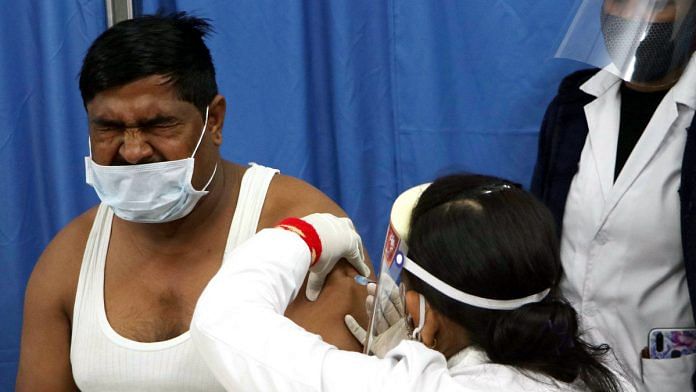New Delhi: It has been just over a week since India began its Covid-19 vaccination drive, and so far, ‘adverse events following immunisation’ or AEFIs have proven to be much smaller in number and magnitude than feared.
The Union Ministry of Health and Family Welfare announced Saturday that over 10 lakh people had already been immunised in the first six days (up to 21 January), but the total number of AEFIs reported by the ministry in its daily press releases so far adds up to 1,239 out of 15,37,190 inoculations, or 0.08 per cent. Just 11 people have had to be hospitalised (0.0007 per cent), while seven deaths have been reported — six of which are “not causally linked” to the vaccine, while in the seventh case, the post mortem report is awaited.
The most common AEFIs reported so far are fever, pain at the injection site and dizziness.
The health ministry defines AEFIs as “any untoward medical occurrence which follows immunisation, and which does not necessarily have a causal relationship with the usage of the vaccine”.
States across the country had to set up an AEFI Surveillance System in accordance with the Covid-19 Vaccines Operational Guidelines framed by the health ministry. Authorities at vaccination sites are required to observe beneficiaries for at least 30 minutes “to detect, manage, and treat immediate adverse reactions”.
Also read: Covid vaccine hesitancy in India down by 7% since Dec, 3% to wait till 2022 to decide — survey
Most common AEFIs
AEFIs are divided into three categories — minor adverse events that include pain, swelling at the injection site, fever and irritability; severe AEFIs “that can be disabling and rarely life-threatening and do not lead to long-term problems”; and serious AEFIs that result in death, or require in-patient hospitalisation, or result in persistent or significant disability.
So far, most of the adverse events being reported across the country have been minor, according to health officials from five states ThePrint spoke to.
“When you take the injectable vaccine, then naturally there is pain for 1-2 days; in that spot, there can be a rash and some kind of temperature,” said Dr Nayan Jani, Gujarat’s State Immunisation Officer.
“Also, many times, when people go to take the vaccine, they get giddy; they can have anxiety as well. These can happen with all vaccines, and not just the ones for Covid-19,” he continued.
Jani added that in Gujarat, 80,000 people have been vaccinated, and only 10-15 AEFIs have been reported, all minor. “There has been redness, pain and giddiness. This is a common phenomenon,” he said.
Balvinder Kaur, State Immunisation Officer of Punjab, added that her state has seen 20-25 AEFIs. “We have those who had minor AEFI like headache, fever, pain at injection site. No one has been hospitalised yet,” she said. “Around three people had a fever; in the case of the rest it was pain at the injection site… nothing more than that.”
In Assam, where 13,881 people have been vaccinated, 19 cases of mild AEFIs have been reported. “There are no serious cases,” said Dr Lakshmanan S., director of the National Health Mission (NHM) in Assam. “Mostly fever, itching and giddiness — these three were the common symptoms which were reported.”
Serious AEFIs
According to the health ministry’s press release, only 11 people have had to be hospitalised so far — just 0.0007 per cent of all people who have been vaccinated. States where the hospitalisations took place include Uttarakhand, Chhattisgarh, Rajasthan, Delhi, Karnataka, West Bengal and Andhra Pradesh.
In West Bengal, the beneficiary who was hospitalised following immunisation had suffered from a “hypersensitivity reaction”. “They had hypokalemia, less potassium and had weakness. The person recovered fully and was sent home after that,” Ajay Chakraborty, the state’s director of health services, told ThePrint.
In Chhattisgarh, two people were hospitalised. According to State Immunisation Officer Dr Amar Singh Thakur, neither case was linked to the vaccine itself.
“In the first case, the person complained of a tingling sensation, so she was kept in the ward to see if there was any progression of symptoms. But there it was found that she was having no problems,” Thakur said. The woman, however refused to go home despite being discharged, and was later referred to a medical college for psychiatric problems.
In the second case, Thakur added, the beneficiary was admitted after she developed a fever and chills. “Later, it was found she had a urinary tract infection… Otherwise there are many cases of fever and sometimes there is pain at the injection site. Some have also complained of nausea,” he said.
Four people were hospitalised in Delhi and two in Karnataka, but the capital’s immunisation officer Suresh Seth and the southern state’s National Health Mission director Dr Arundhati Chandrashekar didn’t respond when contacted by ThePrint through phone calls.
As mentioned above, seven deaths have been reported following vaccination, of which six are not “causally linked”, according to the health ministry. On Saturday, an ASHA worker passed away after suffering a brain stroke days after she was administered the vaccine. The post-mortem report is awaited in this case.
Also read: Why a ‘mucosal’ Covid vaccine has a better shot at ending the pandemic




“Serious side effects from vaccines are extremely rare. For example, if 1 million doses of a vaccine are given, 1 to 2 people may have a severe allergic reaction”
1/2 per million is 0.00015%
0.08% is 533 times 0.00015%.
What was the point of this article again?
Just yesterday 1 millon Londoners were vaccinated , Indian capabilities are down below par in most of the comparative cases including the reporters.